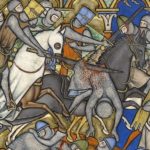We run our website the way we wished the whole internet worked: we provide high quality original content with no ads. We are funded solely by your direct support. Please consider supporting this project.

Jesus Said, “Buy a sword.” What did he mean?
Yesterday, I challenged the common assumption that Jesus was violent when he drove out the animals and turned over tables in the Temple courts. (See post.) Today I want to look at the second episode some site to suggest Jesus wasn’t totally opposed to violence. It takes place just before Jesus and his disciples leave to go pray at the Garden of Gethsemane. Jesus first had his disciples recall the missionary expedition he had recently sent them on. To teach them total dependence upon God, Jesus had forbidden them to take any provisions on this journey (Luke 9:3). Jesus asks them, “When I sent you without purse, bag, or sandals, did you lack anything”? “Nothing,” they all responded (Luke 22:35).
Then Jesus said, “But now if you have a purse, take it, and also a bag; and if you don’t have a sword, sell your cloak and buy one. It is written: ‘And he was numbered with the transgressors’; and I will tell you that this must be fulfilled in me. Yes, what is written about me is reaching its fulfillment” (vs. 36–37).
The disciples happen to have two swords with them, so they showed them to Jesus. “That is enough” he replied (vs. 38).
Does this episode warrant the conclusion that Jesus expects his followers to engage in violence in certain circumstances? A close reading of the text reveals that it teaches nothing of the sort.
First, when Peter used the sword against those who were arresting him, Jesus responded “No more of this!” and healed the man’s ear that was cut off. Jesus rebuked him and told him to put it back in at sheath where it belongs (Luke 22:47-51). When Jesus appears before Pilate he gives the fact that his followers are not fighting as proof that his kingdom “is not of this world.” In this light, it seems clear, whatever Jesus had in mind in telling his disciples to bring swords along with them, it wasn’t for them to ever use them.
What other reason might Jesus have had for making his disciples bring swords? The answer is provided by Jesus himself as explains that it was to fulfill the prophecy, “He was numbered with the transgressors” (Is 53:12). To fulfill prophecy as well as to further force the hand of the authorities, if necessary, Jesus and his band of disciples had to appear to be criminals. More specifically, they had to appear like a typical band of sword wielding zealots, thus justifying the arrest and eventual execution of their leader.
This explains why Jesus says, “It is enough,” when the disciples produce only two swords. If Jesus expected his disciples to actually engage in sword fighting, two swords would obviously be completely inadequate. But for the mere purpose of appearing to be a band of lawbreaking zealots, two swords would suffice.
In light of this, it seems to me that justifying the use of violence by citing this passage is as unwarranted as citing the temple cleansing passage to this effect.
As MennoNerds, we all have found certain distinctives of Anabaptism to be central in our expression of faith. This article is part of a MennoNerds Synchro-Blog in the month of May on Anabaptism.
To find all the other articles in the Mennonerds on Anabaptism synchro blog click here.
Category: Q&A
Tags: Mennonerds, Non-Violence, Violence
Topics: Enemy-Loving Non-Violence
Related Reading

The Unfaithfulness of Violence
For more videos like this be sure to visit The Work of the People.

Can Christians serve in the military?
Question: Jesus ministered to military people (e.g. a centurion) and didn’t tell them to leave their military post. So do you think Christians can serve in the military? I believe it’s a Christians duty is to serve their country, aid the wounded, defend the oppressed, protect our families, stand for truth and justice, and kill…

The Phinehas vs. Jesus Conundrum
I’ll be frank. This is not a blog that will be easy for some people to read. But it’s a blog I believe every follower of Jesus should read – even if you have to force yourself to press on. It’s about something we all wish was not true. It’s about the way the Bible…

The Violent “Church Triumphant”
In light of how central enemy-loving non-violence is to Jesus’ teaching and to his cross-centered revelation of God, we have to wonder why the church has refused to listen to its head and instead condoned violence, as pointed out in the previous post? Christian theologians have used OT’s violent portraits of God, at least since…

Podcast: A Cross Vision Reading of David & Goliath
Dan takes a shot at interpreting the David & Goliath story through a cruciform lens. http://traffic.libsyn.com/askgregboyd/Episode_0294.mp3

That Weird Episode with the Pigs
In my opinion, the single strangest episode recounted in the Gospels is the account of Jesus’ encounter with a demonized man that ended with two thousand pigs drowning themselves in the Sea of Galilee (Mk 5:1-10//Mt 8:28-34; Lk 8:26-39). Some find it morally objectionable that this mass suicide was the result of Jesus allowing the…
